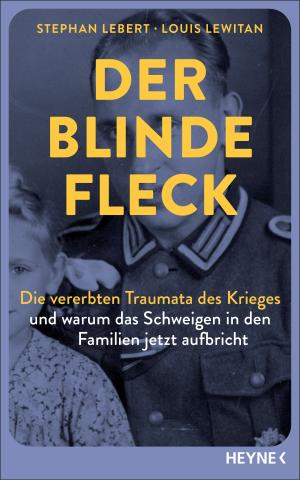A blind spot in many families: the continuing impact of the Holocaust and the Second World War. A fascinating study of the generational trauma of war – and why families are finally beginning to talk.
DER BLINDE FLECK
(The Blind Spot)
by Stephan Lebert & Louis Lewitan
Heyne/PRH Germany, April 2025
 It’s been 80 years since the Holocaust and the end of the Second World War, and only few eye witnesses are still alive. Yet the effects of the past persist. Shaped by a dark age that was over before they were even born, generations are suffering from a trauma whose cause they don’t fully understand: loved ones who show little emotion, feelings of guilt, fear, loneliness, a sense of rootlessness. Many families suffer from a leaden silence – suppressed memories, well-kept secrets, lies that won’t go away. It is an oppressive legacy, whose poison circulates to this day.
It’s been 80 years since the Holocaust and the end of the Second World War, and only few eye witnesses are still alive. Yet the effects of the past persist. Shaped by a dark age that was over before they were even born, generations are suffering from a trauma whose cause they don’t fully understand: loved ones who show little emotion, feelings of guilt, fear, loneliness, a sense of rootlessness. Many families suffer from a leaden silence – suppressed memories, well-kept secrets, lies that won’t go away. It is an oppressive legacy, whose poison circulates to this day.
But now the armour of silence is starting to show cracks. Since ever fewer of them need to fear confrontation with parents or grandparents, they are beginning to investigate their family histories, hoping to discover how they have influenced their own lives. With DER BLINDE FLECK, trauma and stress expert Lewitan and award-winning journalist Lebert have created a unique book on the both difficult and freeing experience of finally facing up to the burden that is your family history. Based on deeply moving conversations with those affected, it is a highly topical contribution to memorial literature.
Stephan Lebert, born in Munich in 1961, is an award-winning journalist. Following spells at the Süddeutsche Zeitung, Spiegel and Tagesspiegel, he is now special projects editor at Die Zeit. He most recently won the 2022 Theodor Wolff Prize, and is the author of Denn du trägst meinen Namen (‘Because you have my name’, 2000), about the descendants of leading Nazis.
Louis Lewitan, born in Lyon in 1955, is a psychologist and a renowned stress and trauma expert with international expertise, thanks to a period spent in New York as researcher and executive director at the International Study of Organized Persecution of Children. Elie Wiesel was the group’s honorary president, and its focus was on the delayed effects of the Shoah on child survivors. Lewitan is the author of several books and was interviewed by Zeit magazine for its ‘How I was saved’ series.
